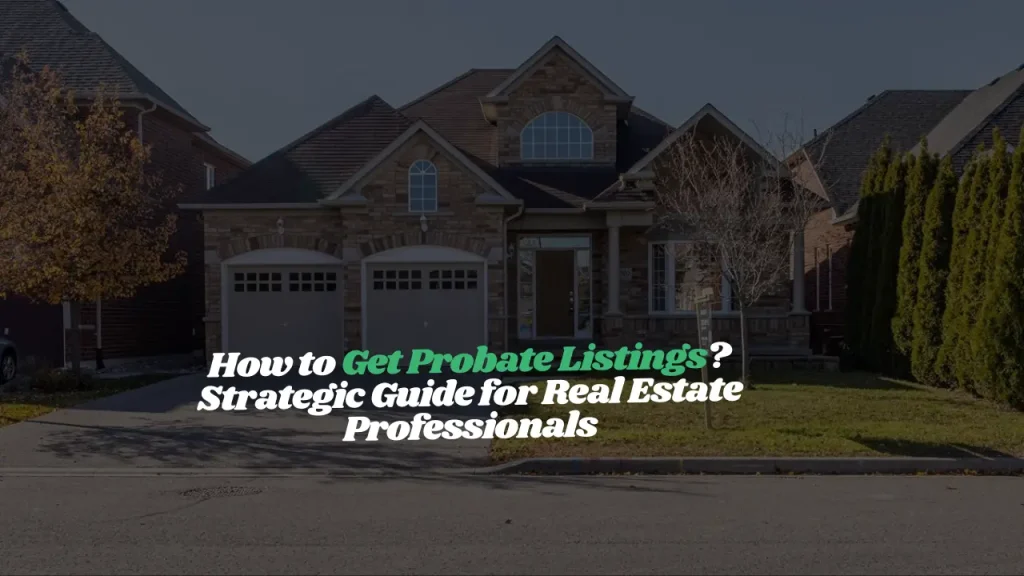How to Get Probate Listings? Strategic Guide for Real Estate Professionals
Probate listings—properties sold as part of an estate settlement—offer unique opportunities for real estate agents and investors. These listings often fly under the radar, making them a niche market with less competition. However, securing them requires a blend of research, empathy, and strategic networking. Here’s how to tap into this specialized sector effectively.
Table of Contents
What Are Probate Listings?
Probate listings are real estate properties that must be sold to settle a deceased person’s estate. The sale is overseen by the court-appointed executor or administrator, who is responsible for distributing assets to heirs or paying off debts. These properties can sometimes be priced below market value, attracting investors and agents looking for opportunities.
Step 1: Identify Probate Cases
Probate filings are public records, so your first task is to locate active cases:
- Monitor Probate Court Filings:
- Visit your local courthouse to review recent probate case filings.
- Use online portals like ClerkBase or LexisNexis for digital access (availability varies by county).
- In California, search the Superior Court Probate Notes system; in Florida, use the Florida Courts E-Filing Portal.
- Subscribe to Probate Lead Services:
- Companies like Probate Leads or EstateExec compile and sell probate data, including executor contact details.
- Expect to pay 50–500/month, depending on coverage area and data quality.
- Set Up Google Alerts:
- Use keywords like “probate hearing [Your County]” or “estate administrator appointed [Your City].”
Related article for you:
Who Pays for a Probate Bond in California? Clear Answer with Key Insights

Step 2: Connect with Executors
Once you identify a probate case, reach out to the executor or administrator:
- Send a Compassionate Letter:
- Craft a brief, empathetic note offering your services. Avoid aggressive sales language.
- Example:
Dear [Executor’s Name],
I understand this is a difficult time, and managing the sale of a property can add stress. As a probate real estate specialist, I help executors proceed through this process efficiently. Let’s discuss how I can assist you.
- Develop Direct Mail Campaigns:
- Use USPS’s Every Door Direct Mail to target neighborhoods with older demographics.
- Include phrases like “We Buy Probate Properties” or “Probate Sale Experts.”
- Cold Calling:
- Use court records to find phone numbers. Start with:
“Hi, I’m [Name] with [Company]. I specialize in probate sales and noticed you’re managing [Deceased’s Name]’s estate. Would you like guidance on the next steps?”
- Use court records to find phone numbers. Start with:
Step 3: Build Relationships with Probate Professionals
Network with those who interact with executors daily:
- Estate Attorneys:
- Attend local bar association meetings or host a lunch-and-learn on probate sales.
- Offer to co-host a webinar: “Probate Real Estate: Simplifying the Process for Executors.”
- Trust Officers and Financial Planners:
- Connect via LinkedIn or local financial planning forums.
- Funeral Homes:
- Partner with directors to leave brochures for grieving families (tactfully).
Step 4: Position Yourself as a Probate Expert
Stand out by showcasing specialized knowledge:
- Earn Certifications:
- Probate & Trust Specialist (PTS) designation (offered by the Probate Real Estate Institute).
- Certified Probate Real Estate Specialist (CPRES) training.
- Create Educational Content:
- Publish a blog or YouTube series: “5 Mistakes Executors Make When Selling a Probate Home.”
- Host free workshops: “Managing Probate Sales in [Your City].”
- Optimize Your Online Presence:
- Use SEO keywords: “probate real estate agent [Your City]” or “sell inherited property fast [Your State].”
Step 5: Consider Legal and Ethical Considerations
- Comply with Solicitation Laws:
- Some states (e.g., Texas, Florida) restrict unsolicited contact with executors for 30–60 days after a death.
- Always include opt-out instructions in emails or mailers.
- Understand Probate Timelines:
- In California, executors must wait 30 days after notifying creditors to sell property (Probate Code § 10300).
- In Florida, the homestead property may be exempt from forced sale (Article X, Section 4).
Tools of the Trade
- Lead Generation: Probate Leads, PropStream, or DrivenIQ.
- Direct Mail: SendOuts or Postalytics for automated campaigns.
- CRM: Use HubSpot or FollowUpBoss to track executor interactions.
Why Focus on Probate Listings?
- Less Competition: Fewer agents specialize in probate.
- Motivated Sellers: Executors often prioritize speed over price.
- Ethical Impact: You provide clarity during a stressful time.
Final Tips
- Be Patient: Probate sales can take 6–12 months to close.
- Offer Value First: Share free resources like “Probate Sale Checklist for Executors.”
- Stay Compassionate: Grieving families remember agents who prioritize empathy over profit.
By mastering these strategies, you’ll carve out a rewarding niche in probate real estate. For state-specific guidance, visit your local probate court website or consult the American College of Trust and Estate Counsel (ACTEC).
About the Author

Sarah Klein, JD, is an experienced estate planning attorney who has helped clients with wills, trusts, powers of attorney, and probate matters. At All About Lawyer, she simplifies complex estate laws so families can protect their assets, plan ahead, and avoid legal headaches during life’s most sensitive moments.
Read more about Sarah
